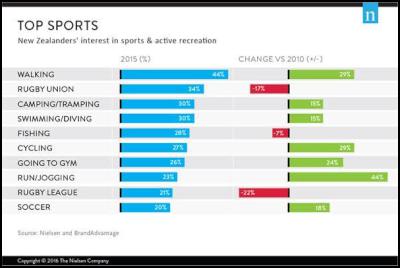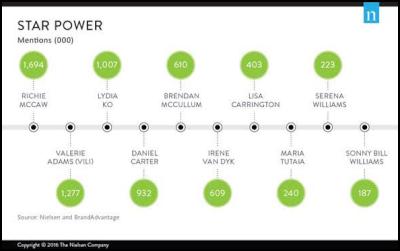Engaging New Zealand Sports Fans
Engaging New Zealand Sports Fans
• Walking is the number one sports and active recreation for New Zealanders, Rugby Union second
• Richie McCaw number one sports person, ahead of Valerie Adams and Lydia Ko
• TV is the key driver of sporting engagement, but it is a close race
AUCKLAND, 4 APRIL 2016 – New Zealanders have moved away from some traditional team and individual sports towards a personal focus on health and wellbeing. New data from Nielsen and BrandAdvantage shows that walking now occupies the number one sports and active recreation spot having seen +29% growth since 2010. Rugby Union is now in second place, -17% since 2010 and camping/tramping third, increasing by 13%. Cycling, going to the gym and running have all seen growth in interest. Soccer is a big winner of traditional sports with 18% growth in the last five years. Rugby league has seen the sharpest decline (-22%). Car racing and netball have also declined and now are no longer ranked in the top 10.

“We’re increasingly spoilt for choice. There’s infinite new ways of accessing sports, news content and live events. This choice and availability, combined with a consumer’s limited time places pressure on the participation and consumption of sports. It doesn’t mean our love affair with the major sports is over, it’s a reflection of changes in personal priorities. In addition, supporters cross over their interests into many sports” said Amanda Wisniewski, Director, Nielsen NZ.
Richie McCaw is New Zealand’s overall number one sports person with 1,694,000 unprompted mentions, ahead of Valerie Adams (1,277,000) and Lydia Ko (1,000,700). Gaining more than half a million mentions are Dan Carter (932,000), Bendon McCullum (610,000) and Irene Van Dyk (609,000). Lisa Carrington (403,000), Maria Tutaia (240,000), Serena Williams (223,000) and Sonny Bill Williams (187,000) make up the rest of the top 10.

“Sports stars thrill and influence audiences. Correctly engaged with a brand they can drive new growth in sales, retain customers and engage and build trade relationships. Sports sponsorship remains one of the most competitive spaces in the industry, both publishers and brands need to understand the changing sports fan with more detail than ever” said Robert Gill, Executive Director, BrandAdvantage.
TV is the key driver of sporting engagement in New Zealand, around two in five keep up to date with sports on TV. The Rugby World Cup final was the second most watched television programme in 2015 (after One News) with an average audience of 673,000. Rugby dominates the broadcast sports coverage, and almost three quarters (72%) of us having watched a live rugby game on TV in the past 12 months.
39% of Kiwis use newspapers to get information and generally engage with sports they are interested in. Just under one-third (32%) use Facebook for this purpose and around a quarter listen to the radio (26%).
1.5 million New Zealanders visited a sport website in February 2016. Seven out of the top ten sites saw growth since February last year. A couple reached audiences of over half a million people in a month, including the number one ranked site, stuff.co.nz with an audience of 669,000*. The TVNZ sports site grew by 87%, MSN sports by 82% and NZ Herald sports by 51%.
Wisniewski adds, “Options to ‘watch the game’ have never been greater and online engagement is skyrocketing. Seven out of ten sports fans use a smartphone and one in three own a tablet. There’s an appetite to provide content that has the ability to view anywhere and anytime.”
*Source: Nielsen Online Ratings, average unique audience March 2014-February 2015, March 2016-February 2016.
ends


 Taupo District Council: Punarua Exhibition Arrives At Taupō Museum
Taupo District Council: Punarua Exhibition Arrives At Taupō Museum Office of Early Childhood Education: Teachers Are Paying The Price For Lack Of ECE Funding In The Budget
Office of Early Childhood Education: Teachers Are Paying The Price For Lack Of ECE Funding In The Budget Science Media Centre: Teen Dies After Controversial Tackle Game – Expert Reaction
Science Media Centre: Teen Dies After Controversial Tackle Game – Expert Reaction Howard Davis: The Amici Ensemble Provide A Master Class In Françaix, Fauré, & Brahms
Howard Davis: The Amici Ensemble Provide A Master Class In Françaix, Fauré, & Brahms Burnett Foundation Aotearoa: Local HIV Diagnoses In Decline, Challenges To Achieving Elimination Goal
Burnett Foundation Aotearoa: Local HIV Diagnoses In Decline, Challenges To Achieving Elimination Goal NZSO: NZSO Classical Hits Tour From Kerikeri To Blenheim Begins 31 May
NZSO: NZSO Classical Hits Tour From Kerikeri To Blenheim Begins 31 May